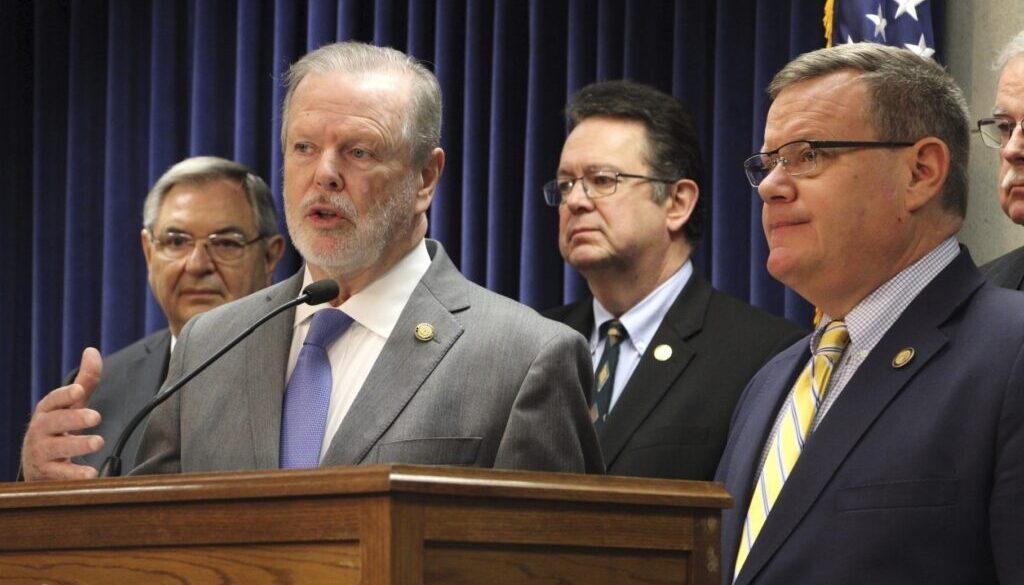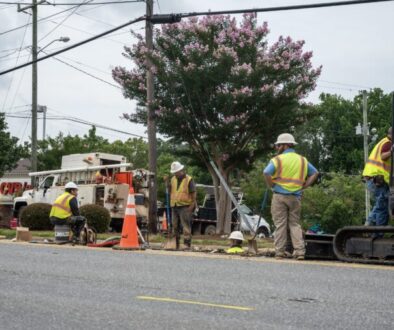Republican legislators reach Medicaid expansion deal
RALEIGH — North Carolina legislative leaders announced last Thursday an agreement to expand Medicaid to hundreds of thousands of additional low-income adults through the Affordable Care Act.
The deal, which likely won’t be voted on until later this month at the earliest, marks a milestone for Republican lawmakers, most of whom opposed expansion for a decade until recently.
North Carolina has been one of 11 states that has not adopted Medicaid expansion. If the deal goes through, the state would start providing expansion coverage to people starting next January.
“This is something that we can all be very proud of,” House Speaker Tim Moore said at a Legislative Building news conference with Senate Leader Phil Berger. “What a huge announcement this is for North Carolina. What a huge policy direction this is that will provide help for so many in this state, but it’s going to do it in a way that’s fiscally responsible.”
Expansion gained momentum last year when the GOP-controlled state House and Senate approved, with strong bipartisan support, competing legislation addressing it, but they failed to reach a deal. The key differences stemmed around other initiatives Senate Republicans insisted were needed to increase the number of medical providers to cover the additional enrollees.
Under the new agreement, senators obtained the loosening or elimination of “certificate of need” laws that require health regulators to sign off on plans to offer hospital beds for mental health and substance abuse patients, build ambulatory surgery centers or purchase MRI machines. But their demand that advanced-practice nurses be able to treat patients without a doctor’s supervision was left out.
“There are still some things that need to be done, but this is our agreement and I’m very comfortable with it,” Berger said.
The negotiated measure, built in part on an expansion measure approved overwhelmingly by the House two weeks ago, was still being drawn up and will need affirmative votes in both chambers.
The federal government covers 90% of the cost of Medicaid recipients under expansion. Potentially 600,000 people in North Carolina could receive the benefit — those who make too much to qualify for conventional Medicaid but not enough to receive heavily subsidized health insurance that President Barack Obama’s signature 2010 law provides.
Under the agreement, the state’s 10% share would be paid through assessments paid by hospitals, which in turn benefit from getting reimbursed as they cover patients with Medicaid.
Officials say the state also would get an extra $1.8 billion over two years through a financial sweetener in a COVID-19 federal relief package from Congress for states that hadn’t accepted expansion.
And the package will include provisions that would result in higher reimbursements for hospital systems when they treat Medicaid patients — resulting in at least $3.2 billion in reimbursements during the next fiscal year for traditional Medicaid patients alone. That should help rural areas, where hospitals have closed or are in danger of closing.
Democratic North Carolina Gov. Roy Cooper, who has sought expansion since taking office in 2017, would be asked to sign any final measure into law. He tweeted that the agreement “is a monumental step that will save lives” but wants it effective immediately to tap into more federal funds, making “sure we leverage the money that will save our rural hospitals and invest in mental health.”
Even if the law is approved this spring, Moore and Berger said it wouldn’t be effective until a separate state budget is enacted, likely by the early summer.
Cooper wasn’t involved in recent negotiations that lasted about four weeks and led to an agreement finalized late Wednesday, the legislators said.
The North Carolina Healthcare Association, representing hospitals and health systems, commended legislators for Thursday’s agreement. The group backs certificate of need laws but offered some ways to scale them back in negotiations last year.
“Expanding Medicaid will improve the health of our people, our economy and our entire health care system,” said Abby Emanuelson, executive director of Care4Carolina, a coalition of over 165 groups that has worked for expansion since 2014.
For years, Republicans in charge of the General Assembly since 2011 had been suspicious of expansion, even passing a 2013 law to block the executive branch from trying to accept expansion on its own.
But GOP lawmakers slowly came around as the Affordable Care Act and the 90% federal share didn’t get repealed by Congress, diminishing worries that state government would have to foot ever more of the costs. And local Republican county leaders endorsed expansion.
A turning point came last spring when Berger explained his switch to supporting it, adding at the time: “If there’s a person in the state of North Carolina that has spoken out against Medicaid expansion more than I have, I’d like to meet that person.”
North Carolina currently has 2.9 million Medicaid recipients. The state Department of Health and Human Services has said up to 300,000 current beneficiaries could lose full coverage as states soon must conduct annual eligibility verifications again following the COVID-19 pandemic. Many being removed would requalify through Medicaid expansion, DHHS said.
 Twitter
Twitter Facebook
Facebook Instagram
Instagram


